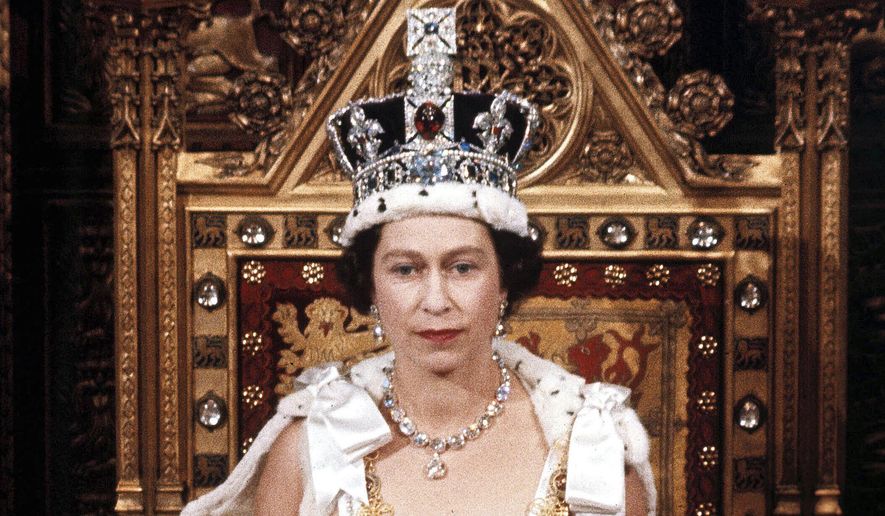OPINION:
Today, Queen Elizabeth II bids farewell to the people of England and passed away after seven decades as the country’s monarch. Her passing is a loss for both the people of Great Britain, its allies and the entire Western world.
An embodiment of courage, dignity and honor from the days of her youth, Elizabeth demonstrated uncompromising love and loyalty to the people of England, setting the standard for how all of us should conduct ourselves in the face of adversity and hardship.
In September 1939 when Britain first entered the Second World War, Elizabeth witnessed her own mother’s courage when she was only 13 years old. The Duchess of York—and later the Queen Mother of England—declined the advice of her counselors by refusing to leave England despite fear of imminent German bombings, and instead sent her two daughters, Elizabeth and Margaret, to safety at their Scottish retreat at Balmoral Castle.
In that same spirit, once Elizabeth turned 18 she became an honorary junior officer in England’s Auxiliary Territorial Service, which trained her as a military driver and auto mechanic as part of the war effort against Germany. Once the war ended, and England was celebrating Victory in Europe Day, the future queen and her sister blended into the streets of London to join her countrymen, and on her twenty-first birthday during a tour to Africa, she made a pledge to her country:
“I declare before you all that my whole life, whether it be long or short, shall be devoted to your service and the service of our great imperial family to which we all belong.”
Five years later on Feb. 6, 1952, the princess was coronated, Queen Elizabeth II. Shortly after handling the Suez crisis, she traveled to the U.S. where she addressed the United Nations and subsequently became the first British monarch to open a session of the Canadian parliament. Against the advice of her counselors, she fearlessly toured the world, visiting Africa, the Middle East and Southeast Asia. British Prime Minister Harold MacMillan said of her, “She has indeed the heart and stomach of a man… she loves her duty and means to be a Queen.”
During the 1960s and 1970s, Elizabeth just did that, as she oversaw dramatic changes in the British kingdom with more than 20 countries in Africa and the Caribbean gaining their independence as part of a shift to self-governance. In 1972, she became the first British monarch to visit a communist state when she set foot inside Yugoslavia, and the following year, the United Kingdom gained entry into the European Union. In 1975, when Australian Prime Minister Gough Whitlam asked her to prevent his ousting, Elizabeth respected the country’s internal politics and said it was not her place to interfere with the Australian constitution.
The eighties and nineties brought many changes to England. Just a few weeks before her son Charles was set to marry Diana Spencer in 1981, Elizabeth survived an assassination attempt as she rode horseback down the streets of London during a ceremony. Authorities later learned her 17-year-old assailant used blanks, but Britons were impressed how, as the shots rang out, their Queen fearlessly maintained her composure. She survived another assassination attempt in October and saw the country through an Argentine attack on the Falkland Islands the following year.
Throughout that decade and the next, she balanced the British monarchy with parliament, learning to work with some of the nation’s most memorable and powerful prime ministers, such as Margaret Thatcher, John Major and Tony Blair. She also became the first British monarch to visit China and the first to visit Russia shortly after the Soviet Union collapsed.
In 1997, Elizabeth was faced with what was probably the most drastic tragedy for England after her daughter-in-law, Diana was killed in Paris. Although it was her preference to maintain what she considered to be a quiet dignity in the wake of Diana’s death, she eventually addressed the people of England to calm them.
“No one who knew Diana will ever forget her,” Elizabeth said of the beloved princess. “Millions of others who never met her, but felt they knew her, will remember her. I for one believe that there are lessons to be drawn from her life and from the extraordinary and moving reaction to her death… It is a chance to show to the whole world the British nation united in grief—and respect.”
As her son Charles now takes the throne and succeeds her, those words remain just as true today with Elizabeth’s passing as they did with Diana’s. Elizabeth’s determination to bring England to the doorstep of the many nations she visited helped spread Western values that Britons, Americans, and Western Europeans all cherish.
At 96 years old, always the stalwart soldier and monarch, Elizabeth was determined to oversee the change of power from Prime Minister Boris Johnson to Liz Truss. Her final duty done, with only one more day’s rest, she finally found peace at Balmoral Castle, her wartime childhood sanctuary. As promised, ever the loyal monarch and servant, she kept her vow:
“I declare before you all that my whole life, whether it be long or short, shall be devoted to your service and the service of our great imperial family to which we all belong.”
For 96 years, God saved the Queen.
Now it is up to us to preserve her memory—and the contribution she made to England and the Western world so that her courage, dignity and honor may continue to set an example for all of us.
• Jeffrey Scott Shapiro is a former Washington prosecutor who also served as a senior U.S. official from 2017 to 2021. He now serves on the editorial board for The Washington Times.




Please read our comment policy before commenting.